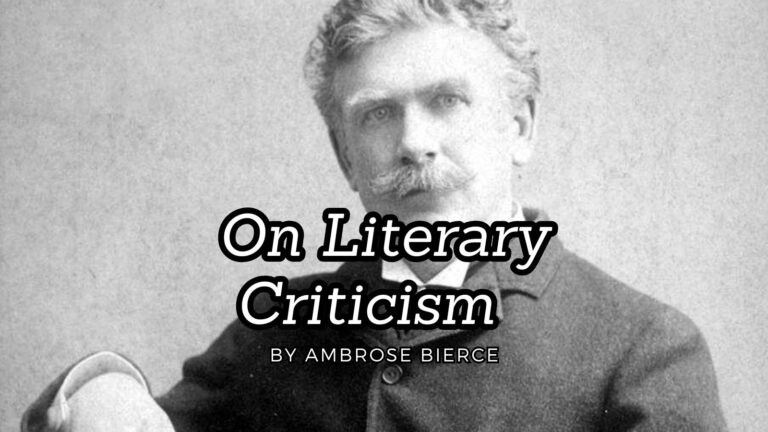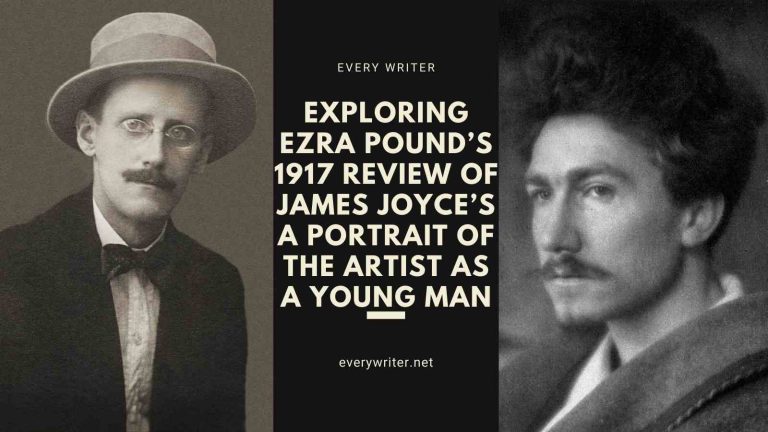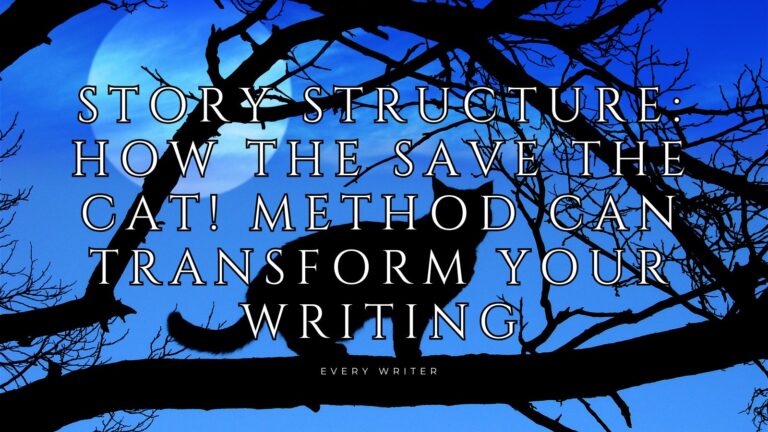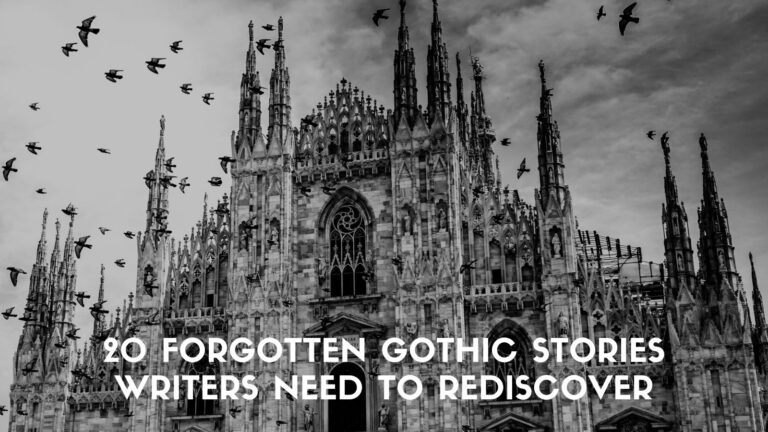Why The Blind Man in Ancient Times was Made a Poet
by William B. Yeats
 A description in the Iliad or the Odyssey, unlike one in the Æneid or in most modern writers, is the swift and natural observation of a man as he is shaped by life. It is a refinement of the primary hungers and has the least possible of what is merely scholarly or exceptional. It is, above all, never too observant, too professional, and when the book is closed we have had our energies enriched, for we have been in the mid-current. We have never seen anything Odysseus could not have seen while his thought was of the Cyclops, or Achilles when Briseis moved him to desire. In the art of the greatest periods there is something careless and sudden in all habitual moods though not in their expression, because these moods [Pg 21]are a conflagration of all the energies of active life. In primitive times the blind man became a poet as he becomes a fiddler in our villages, because he had to be driven out of activities all his nature cried for, before he could be contented with the praise of life. And often it is Villon or Verlaine with impediments plain to all, who sings of life with the ancient simplicity. Poets of coming days when once more it will be possible to write as in the great epochs will recognise that their sacrifice shall be to refuse what blindness and evil name, or imprisonment at the outsetting, denied to men who missed thereby the sting of a deliberate refusal. The poets of the ages of silver need no refusal of life, the dome of many-coloured glass is already shattered while they live. They look at life deliberately and as if from beyond life, and the greatest of them need suffer nothing but the sadness that the saints have known. This is their aim, and their temptation is not a passionate activity, but the approval of their fellows, which comes to them in full abundance only when they delight in the general thoughts that hold together a cultivated middle-class, where irresponsibilities of position and poverty are lacking; the things that are more excellent among educated men who have political preoccupations, Augustus Cæsar’s affability, all that impersonal fecundity which muddies the intellectual passions. Ben Jonson says in the [Pg 22]Poetaster, that even the best of men without Promethean fire is but a hollow statue, and a studious man will commonly forget after some forty winters that of a certainty Promethean fire will burn somebody’s fingers. It may happen that poets will be made more often by their sins than by their virtues, for general praise is unlucky, as the villages know, and not merely as I imagine—for I am superstitious about these things—because the praise of all but an equal enslaves and adds a pound to the ball at the ankle with every compliment.
A description in the Iliad or the Odyssey, unlike one in the Æneid or in most modern writers, is the swift and natural observation of a man as he is shaped by life. It is a refinement of the primary hungers and has the least possible of what is merely scholarly or exceptional. It is, above all, never too observant, too professional, and when the book is closed we have had our energies enriched, for we have been in the mid-current. We have never seen anything Odysseus could not have seen while his thought was of the Cyclops, or Achilles when Briseis moved him to desire. In the art of the greatest periods there is something careless and sudden in all habitual moods though not in their expression, because these moods [Pg 21]are a conflagration of all the energies of active life. In primitive times the blind man became a poet as he becomes a fiddler in our villages, because he had to be driven out of activities all his nature cried for, before he could be contented with the praise of life. And often it is Villon or Verlaine with impediments plain to all, who sings of life with the ancient simplicity. Poets of coming days when once more it will be possible to write as in the great epochs will recognise that their sacrifice shall be to refuse what blindness and evil name, or imprisonment at the outsetting, denied to men who missed thereby the sting of a deliberate refusal. The poets of the ages of silver need no refusal of life, the dome of many-coloured glass is already shattered while they live. They look at life deliberately and as if from beyond life, and the greatest of them need suffer nothing but the sadness that the saints have known. This is their aim, and their temptation is not a passionate activity, but the approval of their fellows, which comes to them in full abundance only when they delight in the general thoughts that hold together a cultivated middle-class, where irresponsibilities of position and poverty are lacking; the things that are more excellent among educated men who have political preoccupations, Augustus Cæsar’s affability, all that impersonal fecundity which muddies the intellectual passions. Ben Jonson says in the [Pg 22]Poetaster, that even the best of men without Promethean fire is but a hollow statue, and a studious man will commonly forget after some forty winters that of a certainty Promethean fire will burn somebody’s fingers. It may happen that poets will be made more often by their sins than by their virtues, for general praise is unlucky, as the villages know, and not merely as I imagine—for I am superstitious about these things—because the praise of all but an equal enslaves and adds a pound to the ball at the ankle with every compliment.
 All energy that comes from the whole man is as irregular as the lightning, for the communicable and forecastable and discoverable is a part only, a hungry chicken under the breast of the pelican, and the test of poetry is not in reason but in a delight not different from the delight that comes to a man at the first coming of love into the heart. I knew an old man who had spent his whole life cutting hazel and privet from the paths, and in some seventy years he had observed little but had many imaginations. He had never seen like a naturalist, never seen things as they are, for his habitual mood had been that of a man stirred in his affairs; and Shakespeare, Tintoretto, though the times were running out when Tintoretto painted, nearly all the great men of the renaissance, looked at the world with eyes like his. Their minds were never quiescent, never as it were in a mood for [Pg 23]scientific observations, always an exaltation, never—to use known words—founded upon an elimination of the personal factor; and their attention and the attention of those they worked for dwelt constantly with what is present to the mind in exaltation. I am too modern fully to enjoy Tintoretto’s Creation of the Milky Way, I cannot fix my thoughts upon that glowing and palpitating flesh intently enough to forget, as I can the make-believe of a fairy tale, that heavy drapery hanging from a cloud, though I find my pleasure in King Lear heightened by the make-believe that comes upon it all when the fool says: ‘This prophecy Merlin shall make, for I live before his time:’—and I always find it quite natural, so little does logic in the mere circumstance matter in the finest art, that Richard’s & Richmond’s tents should be side by side. I saw with delight the ‘Knight of the Burning Pestle’ when Mr. Carr revived it, and found it none the worse because the apprentice acted a whole play upon the spur of the moment and without committing a line to heart. When Ben Bronson’s ‘Epicœne’ rammed a century of laughter into the two hours’ traffic, I found with amazement that almost every journalist had put logic on the seat, where our lady imagination should pronounce that unjust and favouring sentence her woman’s heart is ever[Pg 24] plotting, & had felt bound to cherish none but reasonable sympathies and to resent the baiting of that grotesque old man. I have been looking over a book of engravings made in the eighteenth century from those wall-pictures of Herculaneum and Pompeii that were, it seems, the work of journeymen copying from finer paintings, for the composition is always too good for the execution. I find in great numbers an indifference to obvious logic, to all that the eye sees at common moments. Perseus shows Andromeda the death she lived by in a pool, and though the lovers are carefully drawn the reflection is upside down that we may see it the better.
All energy that comes from the whole man is as irregular as the lightning, for the communicable and forecastable and discoverable is a part only, a hungry chicken under the breast of the pelican, and the test of poetry is not in reason but in a delight not different from the delight that comes to a man at the first coming of love into the heart. I knew an old man who had spent his whole life cutting hazel and privet from the paths, and in some seventy years he had observed little but had many imaginations. He had never seen like a naturalist, never seen things as they are, for his habitual mood had been that of a man stirred in his affairs; and Shakespeare, Tintoretto, though the times were running out when Tintoretto painted, nearly all the great men of the renaissance, looked at the world with eyes like his. Their minds were never quiescent, never as it were in a mood for [Pg 23]scientific observations, always an exaltation, never—to use known words—founded upon an elimination of the personal factor; and their attention and the attention of those they worked for dwelt constantly with what is present to the mind in exaltation. I am too modern fully to enjoy Tintoretto’s Creation of the Milky Way, I cannot fix my thoughts upon that glowing and palpitating flesh intently enough to forget, as I can the make-believe of a fairy tale, that heavy drapery hanging from a cloud, though I find my pleasure in King Lear heightened by the make-believe that comes upon it all when the fool says: ‘This prophecy Merlin shall make, for I live before his time:’—and I always find it quite natural, so little does logic in the mere circumstance matter in the finest art, that Richard’s & Richmond’s tents should be side by side. I saw with delight the ‘Knight of the Burning Pestle’ when Mr. Carr revived it, and found it none the worse because the apprentice acted a whole play upon the spur of the moment and without committing a line to heart. When Ben Bronson’s ‘Epicœne’ rammed a century of laughter into the two hours’ traffic, I found with amazement that almost every journalist had put logic on the seat, where our lady imagination should pronounce that unjust and favouring sentence her woman’s heart is ever[Pg 24] plotting, & had felt bound to cherish none but reasonable sympathies and to resent the baiting of that grotesque old man. I have been looking over a book of engravings made in the eighteenth century from those wall-pictures of Herculaneum and Pompeii that were, it seems, the work of journeymen copying from finer paintings, for the composition is always too good for the execution. I find in great numbers an indifference to obvious logic, to all that the eye sees at common moments. Perseus shows Andromeda the death she lived by in a pool, and though the lovers are carefully drawn the reflection is upside down that we may see it the better.
There is hardly an old master who has not made known to us in some like way how little he cares for what every fool can see and every knave can praise. The men who imagined the arts were not less superstitious in religion, understanding the spiritual relations, but not the mechanical, and finding nothing that need strain the throat in those gnats the floods of Noah and Deucalion, and in Joshua’s moon at Ascalon.
- Story Structure: How the Save the Cat! Method Can Transform Your Writing - April 23, 2025
- HALFWAY TO HALLOWEEN: 50 Words of Horror Contest - April 22, 2025
- How to Edit your poetry for beginners and beyond (with worksheet) - April 18, 2025






